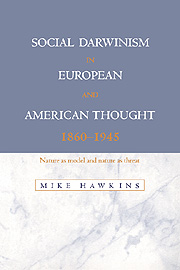Book contents
- Frontmatter
- Contents
- Acknowledgements
- Part I Defining Social Darwinism
- Part II Pioneers
- Part III Case studies
- 7 Reform Darwinism
- 8 Races, nations and the struggle for existence
- 9 The eugenic conscience
- 10 Social Darwinism, nature and sexual difference
- 11 Nazism, Fascism and Social Darwinism
- Postscript: Social Darwinism old and new: the case of sociobiology
- Bibliography
- Index
11 - Nazism, Fascism and Social Darwinism
Published online by Cambridge University Press: 07 December 2009
- Frontmatter
- Contents
- Acknowledgements
- Part I Defining Social Darwinism
- Part II Pioneers
- Part III Case studies
- 7 Reform Darwinism
- 8 Races, nations and the struggle for existence
- 9 The eugenic conscience
- 10 Social Darwinism, nature and sexual difference
- 11 Nazism, Fascism and Social Darwinism
- Postscript: Social Darwinism old and new: the case of sociobiology
- Bibliography
- Index
Summary
Introduction
There is an enormous scholarly literature on Nazism and Fascism, one that is marked by controversy over how the two movements are to be defined, over their origins, sources of support, ideologies and significance. The genocidal policies of the Nazi regime in Germany from 1933 to 1945, culminating in the Holocaust against the Jews, raise additional issues concerning the causes of such actions and the roots of anti-Semitic and racial thinking and policies in German, and more generally, European, culture and history. It has also inclined some commentators to question the extent to which Fascism and Nazism can be considered as members of the same ideological and political family, and to suggest that the latter may be a distinctive and unique phenomenon.
One point on which scholars do seem to have reached a consensus relates to the role of Social Darwinism in both Nazi and Fascist ideology. Social Darwinist ideas are cited as underpinning Nazi policies on war, eugenics and race, and providing a rationale for the emphasis on struggle and conflict found in Italian and French Fascism. Yet there is to date no detailed analysis of the nature and function of Social Darwinism within Nazism and Fascism, or of whether the two ideologies exhibited any significant differences in these respects. The purpose of this chapter is to make a start at filling this lacuna by conducting such an investigation. For the sake of convenience I will deal with German Nazism and Italian Fascism separately, and then conclude by making some general comparative observations.
Information
- Type
- Chapter
- Information
- Social Darwinism in European and American Thought, 1860–1945Nature as Model and Nature as Threat, pp. 272 - 291Publisher: Cambridge University PressPrint publication year: 1997
